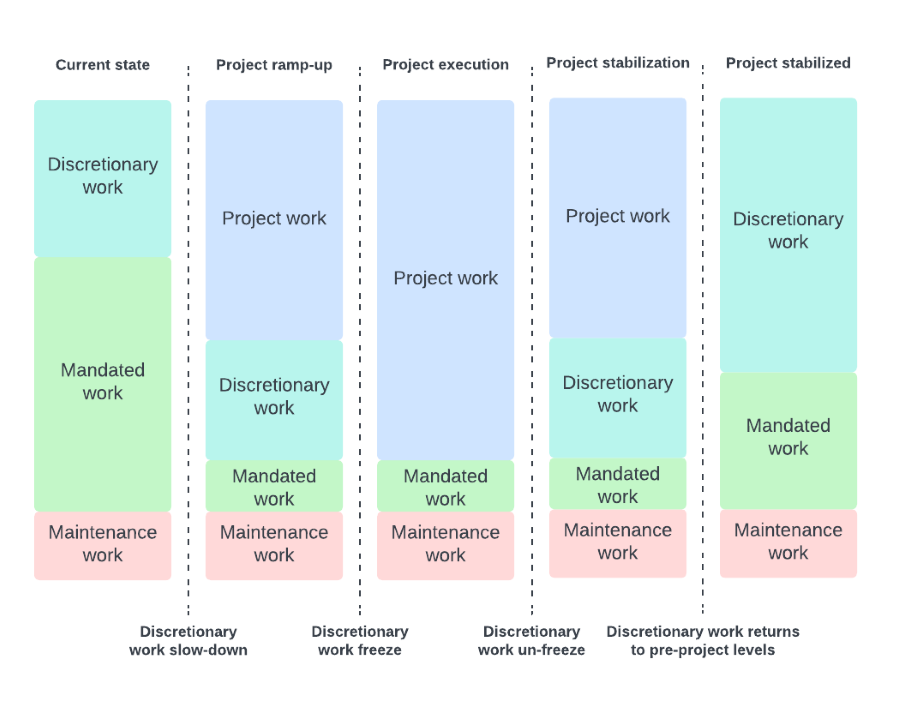Preparing for Change Freezes
The Student Information System (SIS) Project team has begun planning for change freezes that will occur during the execution of the project. These change freezes include both data freezes and technical work freezes.
Data Freezes
The data contained within our student systems and student-related processes is critical to the ongoing business of the university. As we implement new student systems or upgrade existing systems and migrate the data in those systems, we must ensure the integrity of that data.
What is a Data Freeze?
At certain points during the execution of the SIS Project, we will need to stop changes from being made to data within our student systems; this stoppage of data changes is a “data freeze.”
Why Must We Freeze Data?
It is necessary to freeze data to ensure that no data is missed when migrating from old systems and processes to new systems and processes. The project team is developing a comprehensive plan for data migration, and the data freeze is only one component of that plan.
What Data Will Be Frozen and When?
Exactly what data will be frozen, when, and for how long will vary from project to project and is still being determined. As soon as it has been determined, the team will share that information with affected stakeholders and the wider university community.
We expect that each primary project under the purview of the SIS Project team will have at least one data freeze. Primary projects currently include:
-
Replacing ISIS with a new SIS, which is still to be selected
-
Implementing a curriculum management system
-
Implementing the new financial aid system, Oracle Student Financial Planning (SFP)
-
Updating the Graduate Financial Support & Payments Tool (FSPT, formerly known as the Financial Support Request Tool or FSRT)
-
Updating TritonPay to TritonPay 2.0 by implementing a new backend system, Transact
-
Implementing Transact for the Division of Extended Studies
How Will We Manage the Data Freezes?
As the planning progresses for each of the projects listed above, the project and change teams will identify the freezes needed, when the freezes will take place and who will be affected by them. Well in advance of when the freezes are expected to begin, the team will communicate with the affected stakeholders and share timelines, instructions and other key information. The team will also continue to provide updates throughout the duration of the freezes.
Have questions about the data freezes for the SIS Project? Please reach out to us at esr-student@ucsd.edu.
Technical Work Freezes
In addition to temporarily freezing data or records, we also need to create capacity for our technical teams in IT Services to work on implementing the new systems or updating the existing existing systems that make up the scope of work for the SIS Project.
What is a Technical Work Freeze?
The IT Services Student Information Systems teams normally divide their time between maintenance work, mandated work and discretionary work.
Maintenance work is the “keeping the lights on” work done to ensure our systems are available and running as expected. Mandatory work includes making updates to systems in response to policy or regulatory changes. We must do both maintenance and mandatory work. Discretionary work is work we would like to do to improve the user experience or otherwise enhance a system, but work that we are not required to do.
During the execution of the SIS Project, we must stop this discretionary work; this stoppage of discretionary work is a “technical work freeze.”
Why Must We Freeze Technical Work?
In order to create capacity for SIS Project work, we must first slow down and then freeze discretionary technical work. Once the SIS Project has been completed, then the discretionary work will ramp up to normal levels again. The graphic below provides a visual representation of this slow down, freeze and ramp up process.
How Are We Managing the Technical Work Freezes?
The SIS Project change team has already met with stakeholders from Enrollment Management, Academic Affairs, Student Affairs and the Division of Extended Studies to review the queue of mandated and discretionary work, prioritize ongoing and upcoming work, and identify discretionary work that can be put on hold until after the implementation of a new student information system. As new requests from stakeholders are added to the queue, the team will continue to work with the same stakeholders to prioritize the new work.
Have questions about the technical freezes for the SIS Project? Please reach out to us at esr-student@ucsd.edu.

Learn more about the SIS project at esr.ucsd.edu/student.
For questions about the SIS project contact esr-student@ucsd.edu.